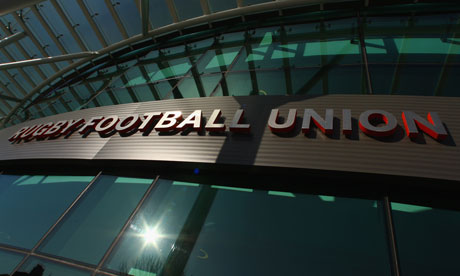
A radical report commissioned by the Rugby Football Union to look at the way it runs the game recommends ending the blazer culture at Twickenham by slashing the numbers on the governing body's council and replacing old-time amateurs with those directly involved in the top end of the game, such as players, referees and Premiership clubs.
The union's 60-strong council will next week consider the report from the legal firm Slaughter and May and its 14-page list of recommendations.
The aim is not only to streamline decision making but to ensure that some of the goings-on this year, when elected members and executives have been at loggerheads, culminating in the sacking of the chief executive John Steele last June, are not repeated. The RFU would become streamlined but there would also be greater accountability.
The sports minister, Hugh Robertson, has told the RFU that after a year of chaos at Twickenham he expects it to act on the findings otherwise the government's financial backing for the 2015 World Cup could come under threat, but any changes would need a two-thirds majority at an annual general meeting of Premiership clubs.
The report recommends that the council is reduced to 25 members operating with reduced powers, monitoring an 11-strong board of directors rather than influencing it. It calls for changes to the way delegates are elected to the council, arguing that the current system, which is based on counties, should be abolished.
It recommends that five regions are created with each electing five members to the council with no one serving more than three consecutive three-year terms. One of the delegates from each region should be from an under-represented group, such as women, ethnic minorities and the disabled, while level one and two clubs should have two each, along with referees, the Rugby Players' Association and the schools and student unions.
The board of directors would be shaken up, reduced in number from 13 to 11 with only three members elected by the council. Three would be executive officers, three would be independent non-executive directors and two would be the respective chairmen of the professional and community game boards.
In another radical departure, Slaughter and May believes the chairman of the board should be elected by the directors, not by the clubs at an AGM. The president of the RFU would no longer sit on the board.
Among the other proposed changes
• Opening membership of the RFU to individuals rather than clubs.
• The entitlement of tickets for member clubs to matches at Twickenham be phased out.
• General meetings and board meetings should be taken to all the regions, not just held at Twickenham.
• Member clubs should no longer elect the president of the RFU – that should be down to the board of directors. The president would no longer sit on the board.
• A remuneration report, cataloguing the audited information about the remuneration, benefits and expenses of each member of the council, board and all committees be included in the annual report for clubs.
• The RFU should publish more information about its governance on its website.
• Consideration should be given to an asset lock that would protect the RFU's profits and surplus from dissipation.
• Council's primary function should be to monitor and oversee the board on behalf of the member clubs. It should not initiate or veto any executive decisions. The general power to manage the RFU is invested in the board, exercised on a daily basis by the executives under conventional delegations.
• A new position of chairman of the council should be created.
• Council should not receive minutes of board meetings nor have an automatic right to access the RFU's books and records.
• Elections to the council in the five regions should be monitored by an independent observer.
• Oxford and Cambridge Universities should no longer be represented on the council, with the three armed forces entitled to one between them, not each.
• All members of the council should undergo an induction programme and a system of appraising the performance of its members introduced.
• Council should meet quarterly with all votes taken by open ballot.
• The board of directors should exercise all powers of the RFU, subject to specific and precise reservations to council and members in an AGM.
• There should be no place on the board for one of the RFU's International Rugby Board delegates ex officio. IRB appointments should be made by the chief executive.
• The rules of the RFU should be changed so that members of the board owe the same duties to the union as they would had it been a company and they were directors of it.
• Board members should undergo continual training and have access to individual professional advice at the RFU's expense.
• The number of committees should be reduced to four.
• The RFU should consult widely, beyond member clubs, before making changes to the game or itself.
• A representative of the top clubs should be given a seat on the board of the body running the 2015 World Cup.
• The RFU's disciplinary powers should be invested in the board, not the council, although it could continue to have a voluntary chief disciplinary officer.
• There should be separate codes of conduct for employees, council members and volunteers.
• The RFU should draw up a confidentiality policy applying to all officers and employees and formulate a media policy.
• Breaches of confidence and of the media policy should be vigilantly pursued and sanctions should be imposed on anyone leaking confidential information, which could result in removal from office or termination of employment.
• The RFU should have a more robust policy on conflicts of interest.
• Officers and employees of the RFU should not retain for their own benefit any remuneration they derive by reason of their office or employment; a register to record all gifts should be set up.

